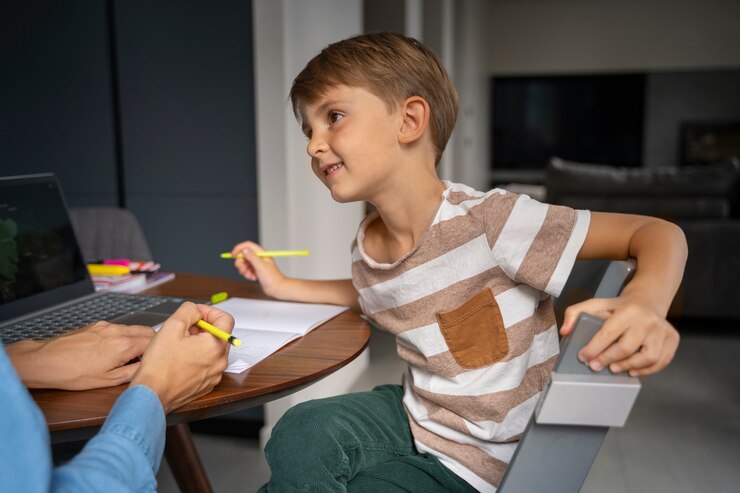The Art of Educating with Discipline: How to Foster Order in Children
The Art of Educating with Discipline: How to Foster Order in Children
 Teaching children to be disciplined can be a challenge, but it’s essential for their development and growth. Discipline helps them learn boundaries and responsibilities, and also cultivates key social and emotional skills. In this article, you’ll discover the art of educating with discipline and how to foster order in children. The secret lies in finding a balance between being firm and understanding. It’s important to establish clear and consistent rules, but also to be empathetic and understand each child’s individual needs. Praise and rewards are also crucial for motivating children and encouraging appropriate behavior. Additionally, being a role model is essential. Children learn more through observation and imitation, so it’s important to show them how to behave correctly. It’s also crucial to teach them self-control and problem-solving skills so they can handle difficult situations appropriately. In summary, educating with discipline involves setting clear boundaries, being a role model, and teaching self-control skills. With patience and consistency, you can help your children develop order and discipline in their daily lives.
Teaching children to be disciplined can be a challenge, but it’s essential for their development and growth. Discipline helps them learn boundaries and responsibilities, and also cultivates key social and emotional skills. In this article, you’ll discover the art of educating with discipline and how to foster order in children. The secret lies in finding a balance between being firm and understanding. It’s important to establish clear and consistent rules, but also to be empathetic and understand each child’s individual needs. Praise and rewards are also crucial for motivating children and encouraging appropriate behavior. Additionally, being a role model is essential. Children learn more through observation and imitation, so it’s important to show them how to behave correctly. It’s also crucial to teach them self-control and problem-solving skills so they can handle difficult situations appropriately. In summary, educating with discipline involves setting clear boundaries, being a role model, and teaching self-control skills. With patience and consistency, you can help your children develop order and discipline in their daily lives.
The Importance of Discipline in Education
Discipline is a cornerstone of education as it lays the groundwork for a structured and focused learning environment. The Order in Children, it provides children with the necessary tools to succeed academically and socially. Moreover, discipline fosters self-regulation, which is essential for lifelong success. When children learn to follow rules and respect boundaries, they develop important skills such as time management, organization, and perseverance.
Understanding Different Types of Discipline
Order in Children: Discipline can take various forms, including positive reinforcement, consequences, and natural consequences. Positive discipline focuses on rewarding desired behavior rather than punishing undesirable behavior. This approach promotes a positive learning environment and encourages children to make good choices. On the other hand, consequences involve implementing a specific outcome in response to inappropriate behavior. Natural consequences allow children to experience the direct results of their actions, helping them learn from their mistakes.
Establishing Clear Expectations and Rules
Clear expectations and rules provide children with structure and guidance. When expectations are ambiguous or inconsistent, children may become confused or frustrated, leading to disruptive behavior. Therefore, it’s crucial to establish clear and age-appropriate expectations and rules from the outset. These should be communicated effectively and reinforced consistently to ensure understanding and compliance (Order in Children).
Consistency in Discipline
Order in Children: Consistency is key to effective discipline. Children thrive in environments where expectations and consequences are predictable and enforced consistently. Inconsistencies in discipline can lead to confusion and resentment, undermining the learning process. Therefore, it’s essential for educators and caregivers to maintain consistency in their approach to discipline, regardless of the circumstances.
Positive Reinforcement and Rewards
Order in Children: Positive reinforcement and rewards are powerful tools for motivating children and encouraging desirable behavior. By acknowledging and rewarding positive actions, children are more likely to repeat them in the future. Rewards can take various forms, including praise, privileges, or tangible incentives. However, it’s important to ensure that rewards are meaningful and aligned with the desired behavior to be effective.
 Effective Communication with Children
Effective Communication with Children
Order in Children: Effective communication is essential for fostering mutual respect and understanding between adults and children. It’s important to listen actively to children’s concerns and perspectives, acknowledging their feelings and validating their experiences. Clear and open communication helps build trust and rapport, making it easier to address behavior issues and resolve conflicts constructively.
Teaching Self-Discipline and Self-Control
Self-discipline and self-control are vital skills that empower children to regulate their thoughts, emotions, and actions. Educators and caregivers can support the development of these skills by providing opportunities for children to practice self-regulation in various situations. Teaching strategies such as mindfulness, impulse control techniques, and problem-solving skills can help children become more self-aware and resilient in managing challenges (Order in Children).
Implementing Consequences and Natural Consequences
Consequences play a crucial role in teaching children about the outcomes of their actions. When implementing consequences, it’s important to ensure that they are proportionate to the behavior and aimed at promoting learning rather than punishment. Natural consequences allow children to experience the direct results of their actions, fostering accountability and critical thinking skills.
 Strategies for Dealing with Challenging Behaviors
Strategies for Dealing with Challenging Behaviors
Dealing with challenging behaviors requires patience, empathy, and proactive strategies. Instead of reacting impulsively, it’s important to understand the underlying reasons for the behavior and address them effectively. Strategies such as positive redirection, conflict resolution techniques, and behavior contracts can help manage challenging behaviors while promoting positive alternatives.
Conclusion: Creating an Enriching and Disciplined Learning Environment
In conclusion, fostering discipline in children is a multifaceted process that requires patience, consistency, and empathy. By establishing clear expectations, modeling appropriate behavior, and teaching self-regulation skills, educators and caregivers can create an enriching and disciplined learning environment where children can thrive academically, socially, and emotionally. With dedication and support, every child has the potential to develop the discipline and self-control needed for success in school and beyond (Order in Children).
Learn more about Order in Children on our YouTube channel.
The Art of Educating with Discipline: How to Foster Order in Children
#ordeninchildren #childrensdisipline #howtofosterordeninkids #childrendeveloporder




